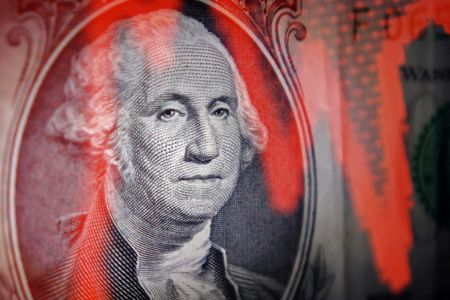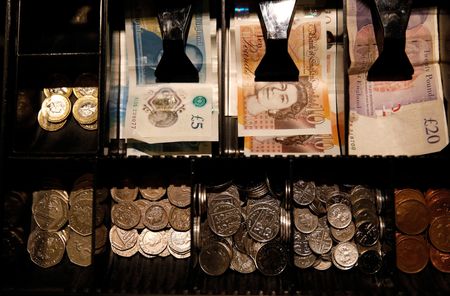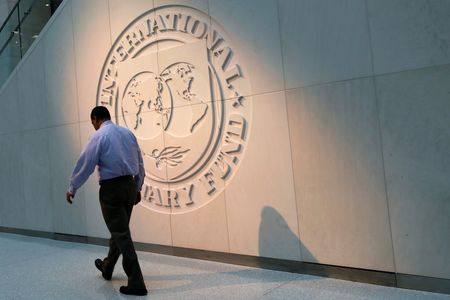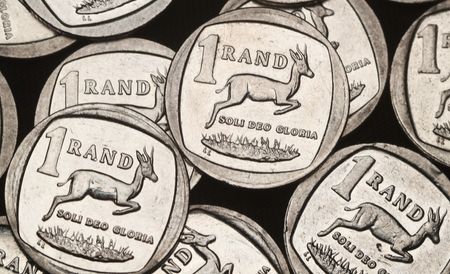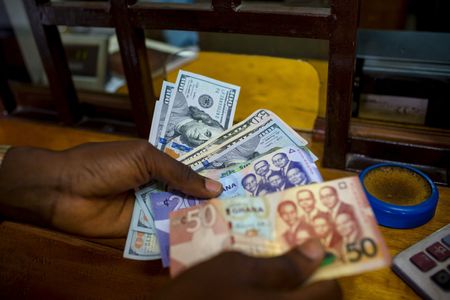By Chibuike Oguh
NEW YORK (Reuters) -The U.S. dollar gained against the safe-haven yen and Swiss franc on Thursday with market nerves soothed by a bilateral trade deal between the United States and the United Kingdom, while sterling reversed gains made after an interest rate cut from the Bank of England.
U.S. President Donald Trump announced a “breakthrough” trade agreement with Britain on Thursday, which leaves in place a baseline 10% tariff on British imports including vehicles.
The market sees the trade deal as positive because it means Trump is envisioning a 10% baseline for friendly countries with anything beyond that subject to negotiation, said Axel Merk, president and chief investment officer at Merk Hard Currency Fund in California.
“The market for whatever reason today takes that as good news. In my view, a 10% baseline tariff is still very high for goods coming into the U.S. and does change in my assessment how global trade operates,” Merk said.
The dollar rose to a four-week high of 146.175 against the yen following the announcement of the trade deal. It was last up 1.55% at 146 yen.
Against the Swiss franc, it was 1.07% stronger at 0.8323 franc, matching its highest level since May 1.
The deal could serve as a template for other countries looking to sign trade agreements with the U.S., said Steve Englander, head of global G10 FX Research at Standard Chartered in New York.
“Getting a deal that looks like it’s going to work is going to be risk positive. I think the market will look at what’s disclosed and ask how much of this will be applicable to other countries or if it’s going to be the template for other deals,” Englander said.
Wall Street’s main indexes, including the benchmark S&P 500, buoyed by market optimism on the trade deal. Gold prices fell with the dollar advancing. Spot gold fell 1.74% to $3,305.76 an ounce.
Trump said he expects substantive negotiations between the United States and China when Treasury Secretary Scott Bessent and chief trade negotiator Jamieson Greer meet China’s economic tsar, He Lifeng, in Switzerland on Saturday.
The BoE’s Monetary Policy Committee voted 5-4 to cut rates by a quarter point, in line with expectations. But there was an unexpected divergence among voting members: two, Swati Dhingra and Alan Taylor, voted for a bigger half-point cut while Chief Economist Huw Pill and external member Catherine Mann wanted to hold interest rates.
The BoE’s decision came a day after the U.S. Federal Reserve held interest rates but said the risks of higher inflation and unemployment had risen.
Sterling gave up earlier gains and was down 0.37% at $1.32410.
The dollar index, which measures the greenback against a basket of currencies including the yen and the euro,rose 0.41% to 100.31, hitting its highest since April 10. The euro was down 0.71% at $1.122175.
The dollar also gained against both the Swedish and Norwegian currencies after Sweden’s Riksbank and Norway’s Norges Bank held rates, as expected. The Swedish crown was up 0.94% at 9.7471 per dollar, while the Norwegian crown was last at 10.4313 per dollar, up 0.99%.
In cryptocurrencies, bitcoin gained 4.68% to $101,293.99. Ethereum rose 16.29% to $2,091.29.
(Reporting by Chibuike Oguh in New York; Editing by Kirsten Donovan and Diane Craft)

